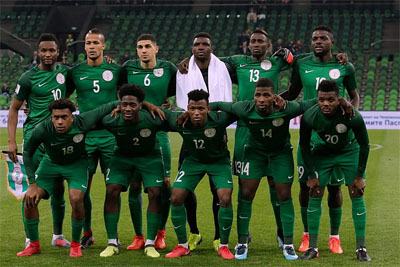Nigeria
Despite its relatively short history as an independent nation, Nigeria is regarded as one of the most consistent teams in Africa. From 1994 to 2018, they’ve qualified for six out of seven World Cups and have reached the round of 16 on three occasions. They’re also a three-time AFCON winner, with several other top three appearances. Their highest-ever FIFA rankings position was 5th, a feat they’ve achieved in 1994. They’re known as Super Eagles.
Main trophies
Africa Cup of Nations: 3
Player records
Most games played: Ahmed Musa (109, in 2024)
Top goalscorer: Rashidi Yekini (37)
Stats

Nigeria line-up before an international match in 2017.
History
History
A slow start
As a British colony, Nigeria participated in various unofficial games from the ‘30s onward. In their official debut in 1949, they defeated Sierra Leone 2-0. The same year, this squad went on to tour the United Kingdom, where they played a host of British amateur teams such as South Liverpool. Upon receiving independence in 1960, Nigeria took part in the 1963 Africa Cup of Nations, where they were defeated in both games.
After failing to qualify for any major tournaments in the following period, Nigeria started to come to the fore of African football. Following two third-place finishes at the AFCON, they won the tournament for the first time in 1980 by prevailing over Algeria in the final. However, they came up short in their next three trips to the finals, losing to archrivals Cameroon in 1984 and 1988 and to Algeria in 1990.
Rise of the Eagles
In 1994, Nigeria returned to the top of the continent by claiming their second AFCON title. A few months after that, they participated in their first World Cup. With two dominant victories over Bulgaria and Greece and a narrow loss to Argentina, Nigeria topped its group. In the round of 16, they were a few minutes away from knocking out eventual finalists Italy; however, Roberto Baggio scored a timely equalizer and won Italy the game in extra time.
Despite these promising performances, Nigeria was considered an outsider at the 1998 World Cup. They proved their doubters wrong by coming back and winning 3-2 against Spain, cinching first place with a 1-0 victory against Bulgaria. In the round of 16, they were surprisingly trounced 1-4 by Denmark. This was followed by another disappointing loss at the 2000 AFCON finals, where they were defeated by Cameroon in a controversial penalty shootout.
The following two World Cups saw Nigeria fail to record a victory in any of their six matches. In 2002, they were narrowly defeated by Argentina and Sweden before drawing 0-0 with England in the final round. In 2010, they again lost to Argentina 0-1 before a 1-2 loss to Greece knocked them out of the tournament. In their final match, they drew 2-2 with South Korea.
Making a comeback
Following a string of third-place finishes at the AFCON from 2002 to 2010, Nigeria won its third title in 2013. This came as a surprise to most neutral observers, as the Eagles struggled in their group, recording two draws and an unconvincing victory against Ethiopia. Still, a 2-1 victory over the Ivory Coast and a 4-1 drubbing of Mali saw them make another finals appearance. Once there, they outlasted Burkina Faso 1-0.
A year later, Nigeria made more waves at the World Cup. After an anticlimactic 0-0 draw with Iran, they grabbed their first victory at the tournament since 1998 by defeating Bosnia and Herzegovina. In another tournament classic against Argentina, they managed to equalize the score on two occasions before losing 2-3. This defeat pitted them against France in the round of 16, where they put up solid resistance but ultimately lost 0-2.
Nigeria was the first African team to qualify for the 2018 World Cup. They were drawn into a strong group consisting of Croatia, Iceland, and old rivals Argentina. After losing the opener to Croatia, they managed to come close to advancing to the second phase by defeating Iceland. However, another loss to Argentina in the final round saw them knocked out.
FIFA World Cup results
Nigeria has participated six times in the World Cup (FIFA World Cup qualification not included).
| Year | Result |
|---|---|
| 2022 | Not qualified |
| 2018 | Group Stage |
| 2014 | Round of 16 |
| 2010 | Group Stage |
| 2006 | Not qualified |
| 2002 | Group Stage |
| 1998 | Round of 16 |
| 1994 | Round of 16 |
| 1990 | Not qualified |
| 1986 | Not qualified |
| 1982 | Not qualified |
| 1978 | Not qualified |
| 1974 | Not qualified |
| 1970 | Not qualified |
| 1966 | Withdrew |
| 1962 | Not qualified |
| 1958 | Did not participate |
| 1954 | Did not participate |
| 1950 | Did not participate |
| 1938 | Did not participate |
| 1934 | Did not participate |
| 1930 | Did not participate* |
* Nigera was part of United Kingdom until 1960.
By Martin Wahl
Logo
 The round badge has a green eagle with its talons holding av football in the center. In the outer part of the badge "Nigeria Football Association" is texted as well as "Abuja" (the capital of the country) in the bottom part (in some versions of the logo, 1945, the year of the foundation is displayed instead).
The round badge has a green eagle with its talons holding av football in the center. In the outer part of the badge "Nigeria Football Association" is texted as well as "Abuja" (the capital of the country) in the bottom part (in some versions of the logo, 1945, the year of the foundation is displayed instead).
External links
References:
https://en.wikipedia.org/wiki/Algeria_national_football_team
https://en.wikipedia.org/wiki/Algeria_at_the_FIFA_World_Cup
https://en.wikipedia.org/wiki/Algeria_at_the_Africa_Cup_of_Nations
https://www.bbc.com/news/world-africa-38488060
Image source:
Дмитрий Пукалик